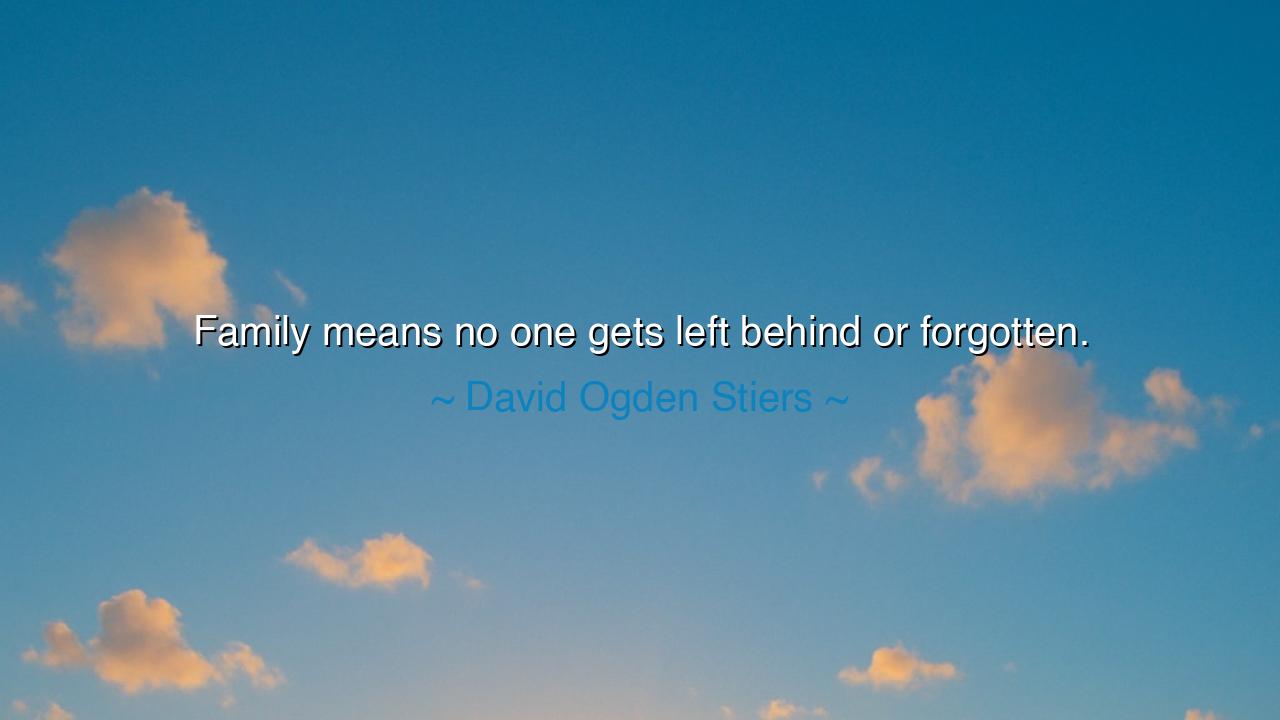
Family means no one gets left behind or forgotten.






Host: The room was softly lit, the evening sun casting a gentle glow through the window, leaving long shadows across the floor. Jeeny sat at the table, her hands wrapped around a warm mug, the steam rising in quiet spirals. Jack, standing by the window, seemed lost in thought, his gaze tracing the distant outline of the city. The air felt thick with unspoken words, as if something important was waiting to be addressed. The stillness between them was both comfortable and charged, as if they were on the cusp of a conversation that could shift everything.
Host: The world outside seemed to be slowly dimming into the night, but inside, the conversation remained suspended in time, waiting for a spark. Jeeny broke the silence, her voice soft, but carrying the weight of an idea that had been growing within her.
Jeeny: “I was thinking about something Ben Affleck said: ‘I never wanted to be famous.’ Do you think that’s true, Jack? That fame is something that people don’t necessarily seek, but that it happens to them, often against their own desires?”
Jack: He turned from the window, his eyes narrowing slightly, clearly processing her words. “I get the sentiment, Jeeny. Fame can feel like a curse, sure, especially when it’s thrust upon you. But I don’t know if people truly avoid it. There’s a certain allure to being known, to being recognized. The problem comes when fame doesn’t meet expectations, but that doesn’t mean people don’t want it — they just might not want the weight that comes with it.”
Jeeny: Her gaze was steady, and her voice softened but carried an underlying certainty. “I get what you’re saying, Jack. But maybe we’re talking about something deeper. Fame doesn’t always reflect what’s inside. It’s an external projection, an image created by society, not the person. When someone says they don’t want to be famous, they’re saying they don’t want to lose their authenticity. Fame often strips away what makes you real, leaving behind a version of yourself that others want to see.”
Jack: He leaned against the window frame, his arms crossed, a faint trace of skepticism still in his voice. “But if fame is something you didn’t ask for, but it comes anyway, doesn’t it become part of who you are? Fame can shape your identity, but it can also limit you. I think what people fear is not losing themselves, but the fear of not being able to control how others see them. People get caught up in the narrative that fame writes for them.”
Jeeny: She nodded slowly, her eyes deepening as she responded. “That’s true, Jack. But what fame does is create a disconnect. It creates a gap between who you are and who the world thinks you should be. The fear of fame is not about losing yourself to the image; it’s about the misunderstanding that comes from being reduced to that image. In that space, you stop being the person you truly are and start becoming the person the world wants you to be.”
Jack: He exhaled, the weight of her words settling in. “But is that all fame does? Just strip you down to an image? What about the people who embrace fame and actually thrive in it? Don’t they find freedom in the attention, in being able to express themselves in ways that are heard by so many?”
Jeeny: “There’s freedom in expression, yes. But fame doesn’t give you that freedom, Jack. It locks you in a box where you’re constantly performing for others. The authenticity you once had is diluted by the need to maintain a public image. People may embrace fame, but what they’re embracing is not the reality of their lives — it’s the idea of who they’ve become in the eyes of others. And that’s a dangerous cycle.”
Jack: He paused, the skepticism in his expression slowly melting into something more reflective. “So, it’s not just about fame being undesirable; it’s about losing yourself to it, becoming trapped in a role. I see that now. But is that always the case? Can’t fame be used as a platform for something positive, to make a real difference?”
Jeeny: Her eyes softened, the intensity in her voice giving way to a gentler tone. “Fame can give you a platform, yes. But the question is how you use it. If you stay true to yourself and your values, maybe it can be a tool for change. But that’s not the reality for everyone. For many, fame becomes about maintaining an image, about constantly seeking approval. And in that, you lose the real opportunity to connect with others on a genuine level.”
Jack: He looked out the window again, his gaze distant, his thoughts now quiet but deeply considered. “Maybe it’s about the balance. Maybe fame isn’t inherently bad. Maybe it’s about how you handle it, how you stay grounded.”
Jeeny: She smiled, a quiet understanding in her eyes. “Yes. It’s about knowing who you are before the world tells you who you should be. And remembering that authenticity is what gives you real freedom, not the attention or recognition you might get from others.”
Host: The room had grown still, the night outside deepening, but inside, there was a quiet understanding that had settled between Jack and Jeeny. Their conversation had unraveled the deeper layers of fame, peeling back the layers of public life to reveal its true cost: the loss of self. As Jack stood by the window, his gaze contemplative, and Jeeny sat at the table, her presence serene, both understood that true freedom was not found in fame, but in staying true to who we are, in spite of it. The night outside had fully settled, but the quiet truth within the room remained.






AAdministratorAdministrator
Welcome, honored guests. Please leave a comment, we will respond soon